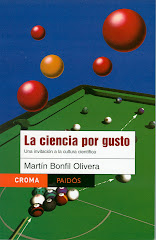by Martín Bonfil Olivera
Published on Milenio Diario, December 24, 2008
 The Special program of Science and Technology (PECyT, Programa Especial de Ciencia y Tecnología) 2008-2012, published on December 17 by the Official Government Diary is obtuse and lacks ambition. It conceives science not as an integral part of society, but as an matter of elites.
The Special program of Science and Technology (PECyT, Programa Especial de Ciencia y Tecnología) 2008-2012, published on December 17 by the Official Government Diary is obtuse and lacks ambition. It conceives science not as an integral part of society, but as an matter of elites.
Mi colleagues Arturo Barba and Horacio Salazar are ahead of me on commenting the issue, but it is worth to make the point once again: if the idea is, as declared in the program's objectives, "to strengthen the education-basic science and innovation-technology-application chain", "to encourage a greater financial support" of these areas and "to evaluate the application of public resources that are going to be invested", this cannot be achieved in a society that does not know, understand or is interested in supporting science and technology (I do not know what is the difference between the latter and "innovation").
True enough, the PECyT mentions the promotion of scientific culture (strategy 1.4) and talks about "perception, appropriation and social recognition of science", about encouraging science popularization and support for projects as well as museums and organizations dedicated to science. But in the central scheme that shows the "National System of Science and Technology" (Sistema Nacional de Ciencia y Tecnología), where the general concept of the program is defined as well as its participants and organization, the President of México is included (at the top of the list), as well as the National Committee for Science and Technology (Conacyt) and government institutions, and (right at the bottom) the scientists, businessmen and students… but the common citizen did not make it to the list. A vertical and excluding scheme.
The PECyT 2001-2006, conceived during the government of Vicente Fox, promised "to make bigger efforts so that the spreading of scientific knowledge reaches more people". It explicitly included popularization in their objectives (2.6) and mentioned a "special fund for scientific and technological popularization", from which the scientific community did not see a penny. In practice, nothing changed: science popularization in the Country remained, as usual, limited by the achievements of individual popularizers, professional organizations, public universities and media. The government still believes that scientific progress is achieved by decree.
When are we going to understand that our first need is a population that knows, appreciates and supports science?
Merry Christmas!
(translated by Adrián Robles Benavides)
To receive Science for pleasure weekly
in your email, subscribe here!




No comments:
Post a Comment